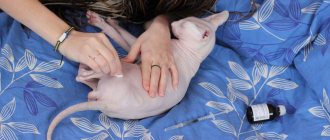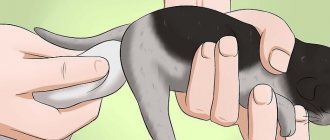Cats communicate with each other in a variety of ways. These animals prefer to “talk” to humans in the language that is most understandable to them: by giving sound signals. To a caring owner, the nature, intensity and duration of a cat's meow (or other sounds) can explain what information the pet is trying to convey to him. If a person has recently brought home a new tenant, and the kitten meows all the time, then it is necessary to figure out what the animal wants to say, what is bothering him. Kittens meow for a variety of reasons.
Longing for mother
If a kitten has just moved to a new home, then there may be many reasons why he is making meows and other sounds. All of them will be discussed below, and the first will be called longing for a cat mom.
It is recommended to adopt kittens at 1.5-2.5 months. At this age, they already know how to feed themselves and have learned most of the “cat wisdom.” However, separation from the mother still brings discomfort to the kitten. He can meow pitifully and look for the usual warm barrel.
You can help a small pet by taking him in your arms when he is crying pitifully, warming him with your own warmth, stroking him, caressing him. It is advisable to talk to him in a peaceful and calm voice.
Often kittens wake up at night and, not feeling the usual warmth and smell, begin to meow. At such moments, it is important to calm the pet with tactile contact. Over time, the kitten will stop looking for its mother. The time to get used to new conditions varies from person to person, but as a rule, it does not last too long.
How to quickly calm a meowing kitten?
The following techniques will help you stop meowing:
- take the pet in your arms and gently stroke it;
- switch attention: while meowing, make a distracting sound - throw a bunch of keys next to the kitten, clap your hands;
- snap your fingers near your ear;
- if the meowing is associated with extortion of a treat or a request to be let into the bedroom, you should not respond to provocation.
You cannot scold a kitten, much less beat it. The cat will no longer perceive the offender as the dominant individual in the pride and will transfer him to the category of enemies from whom he needs to hide.
Should the baby be examined to see if he is bothered by fleas? If this is the case, the pet is treated with insectoacaricidal shampoos or I use a drug that is suitable for the kitten’s age.
Hunger
A kitten may give a vocal signal for a completely natural reason: it is hungry. This is the most common reason why animals meow. This applies to both children and adult pets. First of all, any living organism tries to satisfy its nutritional needs. And the kitten, once in a new place, first learns where the “food source” is located. Not finding food, the small animal begins to worry, and then declares its needs to the person.
It is advisable that there is always some food in the bowl; this will save the owner from constant plaintive cries.
In some cases, the cause of meowing is pseudo-hunger. That is, the kitten is full, but with the help of its voice it tries to beg for tidbits. Usually this characterizes the pet in a certain way: he wants to dictate conditions, tries to beg for something tasty, and thereby force the person to follow his lead. As with children, you need to be firm. You cannot indulge your pet's first desire. This does not mean that an animal should not be pampered at all, but in childhood this is especially fraught with consequences. If a person does not want to constantly endure impudent extortion from the cat, then he should make it clear from the very first attempt who is boss in the house. The pet must understand that nothing will be given to him upon request, and the decision as to whether he will receive a treat or not will be made solely by the “senior”.
Conversations
Why else would a kitten meow constantly? Surprisingly, in this way he simply talks to you. Animals, like people, can be sociable and not so sociable. Therefore, you shouldn’t be surprised that someone is silent all day, while someone “talks”, you shouldn’t be surprised. No one can say for sure what kind of character your pet will have!
It is impossible to silence the cat in this case. After all, he will still crave communication. The only way that will help here is to talk to the cat. No matter how strange it may sound, you need to communicate with your pet. Then he will answer you when you need it.
Interestingly, cats only communicate with people by meowing. This sound was invented exclusively for us. It is almost impossible to see cats “communicating” with each other in this way.
We hope you now understand why the kitten constantly meows. Yes, there are many reasons. And you must get to know your pet better to understand this issue.
Stressful state
The constant meowing of a kitten when it has just arrived in a new home is associated not only and not so much with longing for its mother, but with stress from the new space and smells, and the need to master an unusual environment. In the first days, a kitten may be simply scared in a new apartment; he experiences loneliness and feels helpless.
If other animals arrive at the same time, this is a source of additional stress. After all, you need not only to master the space, but also to seek contact with new animals.
The owner needs to calm the animal down, talk to it affectionately more often, pick it up, and stroke it. Over time it will get used to it. To make this happen faster, experts recommend that when picking up a cat from a breeder or cattery, ask for something with a familiar smell to the animal. This could be the bedding on which the kitten is laid when it begins to meow pitifully. The native smell, reminiscent of his mother, will calm him down.
Finding a toilet
A small animal may scream in confusion, not knowing where to relieve itself. In such cases, you should put him in a tray and, if possible, explain why this device is needed. Even if the kitten is accustomed to the tray, in a new place he may not understand what this piece of furniture is for, so it is necessary to show it. By the third or fourth time, the animal will definitely understand the purpose and location of the toilet. In some cases, once is enough.
If a kitten comes to a new home at a very early age (up to a month), it may be in pain if it wants to go to the toilet. The fact is that a cat constantly licks newborn kittens, and this action has different purposes. Mom doesn't wash the babies as much as she massages them. This stimulates the kitten's still weak intestinal peristalsis. In such cases, the owner needs to gently massage the pet’s tummy, starting the process of defecation.
How to trim your nails calmly
There is the simplest way to calm a cat before trimming its claws: you need to attach a pair of clothespins (with weak compression force) to the scruff of the neck.
You need to prepare in advance for a long trip by train, car or flight.
This is where psychology comes into play; in childhood, a cat carries a kitten, holding this place with its teeth; if there is compression in the nape area, the animal instinctively calms down and relaxes.
Demanding attention and affection
Although cats show individuality, sometimes they behave like royalty who do not care about others, they still need communication. In the house where he was born (except for exceptional cases when the baby is left without a mother immediately after birth), the kitten always has playmates. These are brothers and sisters and a mother cat who explains the rules of behavior to the baby and instills the necessary skills. Finding itself alone in new conditions, the kitten will seek the company of a person, ask to play with him or pet him.
Outdoor games with a kitten will not only ensure its normal physical and mental development. Having played enough and been properly tired, the kitten will stop wandering around at night and bothering its owners with screams.
How to identify the cause of anger in a cat
Irritability in adult animals is provoked by a painful condition.
Domestic cats, unlike dogs, have retained many qualities inherent in wild animals. Instinct tells them that danger can come from any object.
Pain inadvertently inflicted on a cat by a person leads to the idea that he poses a danger.
What can cause panic and aggression in an animal:
- moving, unfamiliar surroundings;
- the appearance of new things, other animals in the house;
- strangers (especially if they try to touch or stroke him);
- household appliances that make loud sounds (vacuum cleaner, electric meat grinder, etc.);
- poor health, illness;
- excessive affection from a person;
- games with children if the latter begin to cuddle the pet.
Onset of puberty
Different breeds of domestic cats reach puberty at different times. Most young individuals are ready for intercourse by 6-7 months. In some breeds, such as Maine Coons, it may begin at this age, but last slightly longer, up to about 15 months.
The play of hormones, the powerful instinct of procreation felt by a young animal, makes it restless. It will scream loudly at any time of the day, roll on the floor, and demand to be let out into the street.
During this difficult period, some individuals may show aggression towards humans. Cats begin to mark their territory, and their smell at this time intensifies several times thanks to hormones.
The owner of a domestic cat should immediately decide on a solution to this problem. There are actually two of them: castration (sterilization) or providing the opportunity for the realization of instinct. In all other cases, the animal will experience real agony during periods of sexual heat. There is no need to be afraid to sterilize an animal if the owner’s plans do not include breeding cats. Veterinarians believe that this simple procedure not only does not cause harm, much less moral suffering, to the animal (they simply have no morals), but even prolongs life and preserves health.
Options for how to wean
Why does a cat bite its owner’s legs: when you stroke it and for no reason
It is much easier to wean a young cat from bad behavior than an adult cat. Owners are interested in why the cat bites when you pet it. The method of education depends on the reason for the behavior.
After playing with human bites, the animal gets used to this behavior
Wean the kitten
If the kitten is very active and bites, the veterinarian will tell you what to do. It is recommended to adhere to the following rules for correcting behavior:
- Check the health status and quality of internal organs using laboratory and instrumental examination methods at a veterinarian. If the cause is illness, it is treated so that the pet’s behavior returns to normal.
- Treat your pet kindly. You need to pet him, scratch his belly and ears. But if the kitten resists, it is released, since forcefully shown affection also leads to aggression.
- Maintain proper nutrition. The cat may be hungry because the diet is incorrect or it receives a minimal dosage of food. Ask the veterinarian about the daily diet, the dosage of 1 serving of food.
- Eliminate the possibility of excessive gaming. It should not lead to overstimulation. The animal is made to understand that scratching and biting can only be done with a scratching post or toys; humans are not meant to do this.
- Give treats for good behavior. If the kitten does not obey and bites the owner, he is not given treats. This forms a strong character and affection towards a person.
- If a cat bites, there is a simple way to eliminate the reaction. When a cat bites a hand, it is not pulled out of the mouth, but moved deeper into it. This will cause confusion. Then the hand is pulled out, making loud noises so that the pet is uncomfortable.
- Completely limit the young kitten's ability to attack humans. He should not play, bite his fingers, throw himself on his feet.
- Already at a young age you can go to the veterinarian and have your nails trimmed. Keeping them blunt will prevent the possibility of injury to any family member's limb.
Attention! If the kitten continually bites despite crossing, consult a veterinarian or other animal behaviorist.
Wean an adult cat
It is much more difficult to wean an adult. After the owner has found out why the cat bites when you pet it, it is necessary to begin educational actions.
- Violence is not recommended, but you can lightly flick a newspaper or a stack of papers on the diarrhea or tail. In this case, you should make loud sounds that the cat cannot stand.
- Stop bites in a timely manner. If a cat bites, put something bitter in its mouth, for example mustard. Do this every time the habit appears. Gradually, the cat will remember that it will be unpleasant for him to bite.
- You are not allowed to use your own hands in the game. Toys are used for biting. Any painful contact with the human body is prohibited.
- Eliminate the presence of other animals in the yard. If one cat lives in the house and the others in the yard, jealousy of the owner appears, so the pet exhibits negative behavior. If the owner wants to keep the yard animals, you can close the curtains and not let the cat outside so that he does not see his rivals.
- It is not recommended to touch or stroke an animal if it does not like it. Cats, just like people, have periods when they want to eat and sleep, but not play. If the animal begins to purr, this means that it is ready for contact.
Aggressive behavior
There are many methods that can be used to eliminate bad habits in a cat. But before that, you need to find out why he bites. The reason may be in the owner himself, in his behavior. Negative factors must be completely eliminated for the animal’s behavior to return to normal. Then it will purr and not bite. If you do this at a young age, there should be no problems with the cat later.
Diseases and conditions requiring medical attention
A kitten may cry and meow loudly because something hurts. The cause of pain may be poor digestion or a serious illness. It is necessary to carefully examine the pet and observe its behavior.
The following symptoms should alert the owner:
- increased body temperature, dry nose (in cats the normal temperature is about 38 degrees, in a kitten this figure can vary significantly, since the process of thermoregulation has not yet been established);
- prolonged cleanliness in the tray or, conversely, diarrhea;
- blood in the urine or stool;
- vomit;
- loss of appetite or complete refusal to eat;
- discharge of various types from the eyes, ears;
- swollen, hard tummy;
- impaired coordination of movements.
You should also observe how often the kitten itches. If he constantly bites himself, gnaws something in his fur, or scratches himself heavily, this is a sign of infection with ectoparasites. If these symptoms appear, you should immediately show the animal to a veterinarian. He will determine the cause and prescribe the necessary treatment.
Methods of helping a kitten
The kitten should be taken away from its mother no earlier than 1.5-2 months. By this age, animals are already sufficiently socialized and trained in all the necessary skills. At first, the baby will still look for his mother, so the owner needs to pay more attention to the pet and talk to him more often. The animal should be provided with toys that will distract its attention and help pass the time while it is left alone. Returning home, you can hear the kitten's pitiful cries. This can mean both a joyful greeting and complaints of loneliness and hunger. In any case, you need to immediately pick up the kitten, pet it, and then feed it. Over time, a caring owner will learn to understand what exactly the pet is “telling” him.
If circumstances were such that the kitten had to be adopted very young, then for some time the person will have to become its mother. A newborn cat needs to be fed constantly, once every two hours. At 2-3 months the cat is switched to six meals a day. By 6 months, the number of feedings is reduced to 4 times, and by a year - to two.
A small kitten also needs abdominal massage to keep its bowels moving smoothly. You need to do the procedure after eating, and then put the baby in the tray.
The owner will also have to solve the pet’s sexual problems. When meowing expresses the animal’s desire to procreate, you should contact a veterinarian. It is recommended to castrate and sterilize cats between 8 months and a year. If the vocalizations that indicate puberty have begun early, your veterinarian may recommend hormonal or sedative medications for cats. It is advisable not to prescribe medications to the animal yourself, but to leave it to a specialist.
Cases requiring contact with a veterinarian
If a cat constantly meows and itches, then he may have fleas, lice eaters, or other ectoparasites (living outside). Allergies and ear mites may also have such manifestations. It is necessary to show your pet to a doctor to determine the cause of this behavior and determine measures to help.
A hard, inflated belly speaks together with a loud meow, serious anxiety or, conversely, lethargy; increased appetite or its absence indicates a helminthic infestation.
In such cases, you should consult your veterinarian. He will prescribe an anthelmintic and tell you how long to give it.
If the kitten cries loudly and trembles at the same time, you can try to warm it or feed it. If the cause is not hunger and cold, then you need to see a doctor, as this may be damage to the spine.
Refusal to eat, diarrhea, or, conversely, cleanliness in the tray for a long time, accompanied by plaintive and constant meowing, is also a reason to seek medical help.
A caring owner always understands his pet. Cats have almost no means of expressing their complaints or wishes other than by making sound signals. It is important to understand what the pet wants to communicate and provide him with all possible assistance.
Signs of aggression in cats
Before using any sedatives, you should consult a veterinarian.
The reaction to stress manifests itself differently in cats, and an inexperienced owner may not immediately recognize fear in the animal’s behavior.
When cats behave nervously:
- lick the skin on one side of the body (one paw, one side);
- calm themselves by making loud purring sounds;
- become completely indifferent to their favorite food or become overly gluttonous;
- They begin to gnaw on various objects and chew indoor flowers.
In case of severe fright due to a loud sound or the appearance of a dog, pets:
- they freeze in place, flattening their ears, tucking their paws and tail under them;
- attempt to escape;
- trying to hide in a dark, secluded place.
During an attack of aggression, small predators begin:
- arching the back to look larger, inflating the tail and hair on the body;
- hiss loudly, snort, howl, showing his teeth;
- look closely at the object that causes aggression;
- rhythmically whip the tail over the body, twitch it;
- hit an approaching object with the front paws with claws extended.
If a panic reaction occurs (if the cat was unable to hide or protect itself), the animal experiences:
- copious flow of saliva, similar to foam;
- loud scream, heartbreaking meow;
- involuntary urination.
Be sure to read:
Which mat cutter is best for cats: straight, curved, how to use it, how much it costs











